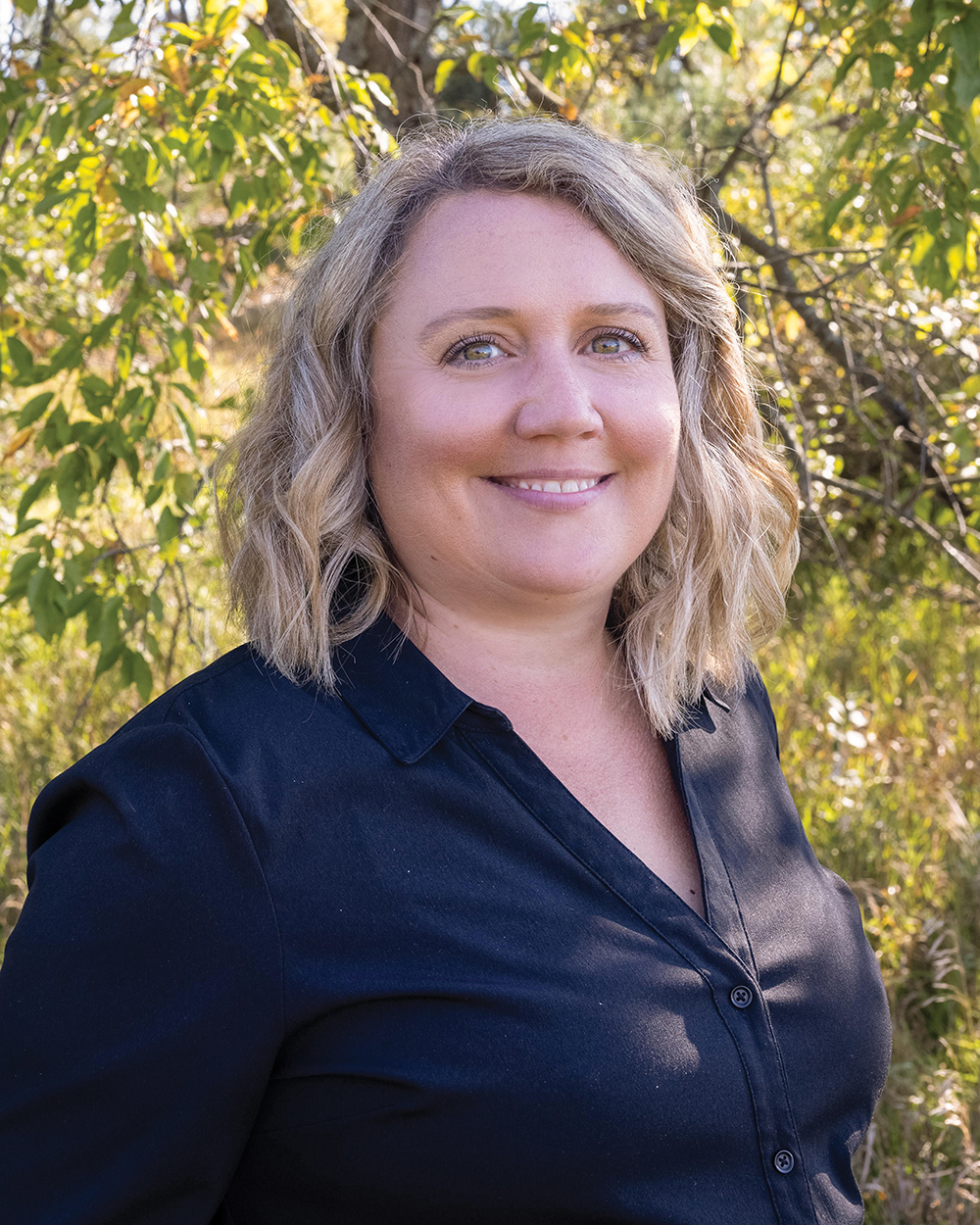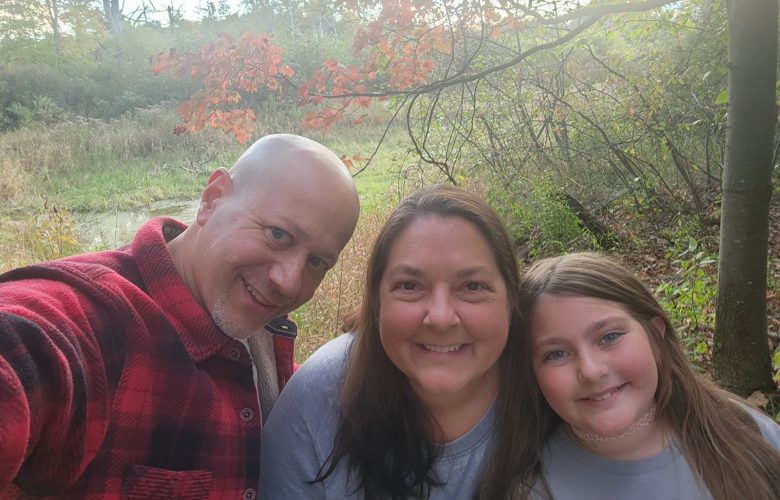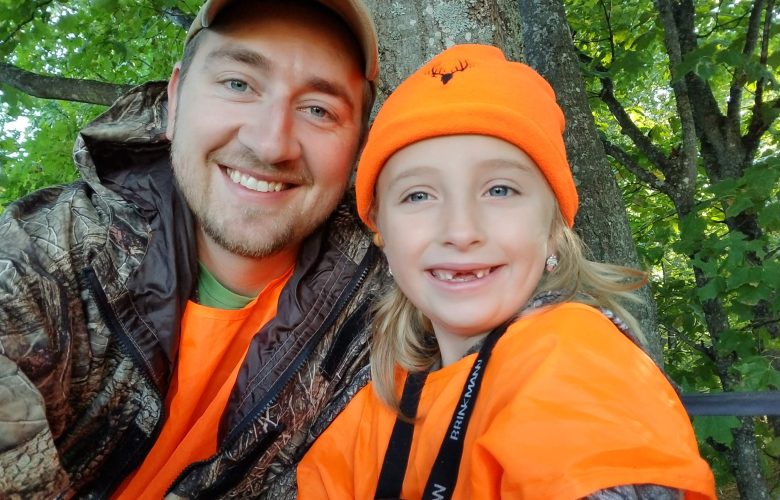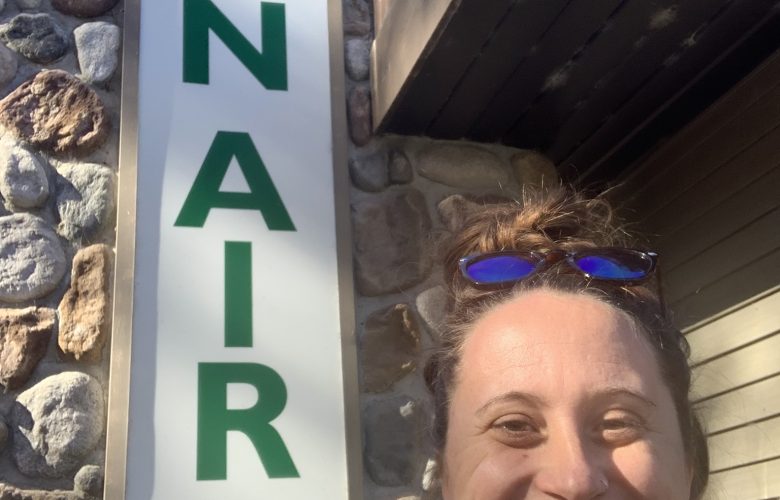Questions & Answers with community faces
Jessica (Glynn) Carland (41) spent her summers at the Congregational Summer Assembly (CSA), where her family has been vacationing since the mid-1950s. The Glynns moved from central Illinois to Grand Rapids when she was a teenager, and she graduated from Ottawa Hills High School in 1999. She worked in Grand Rapids for a few years and then moved in 2001 to Missoula, Montana, where she attended the University of Montana; she graduated in 2007 with a Bachelor of Arts degree in communication studies, and then she worked for a short time in an ophthalmologist’s office.
In 2008, Carland moved back to Michigan briefly, and she stayed at her mother’s home in downtown Frankfort while she worked at Arcadia Bluffs as a server/barcart host in 2009. This is where she met her future husband, Custer Carland, just two months before she was to move to Perth, Australia, to attend Murdoch University for a Master’s degree program in sustainable urban and regional planning, which she received in 2011.
For her Master’s thesis, Carland assisted the Michigan Land Use Institute (MLUI, now called Groundwork Center for Resilient Communities; founded in Beulah but now headquartered in Traverse City) in 2011 to conduct research on the integration of public art and public transit—she started this project virtually from Australia, but completed the work when she moved back to Michigan.
After that, she worked for Beckett & Raeder consultants in developing the City of Frankfort’s Parks and Recreation Five-year Plan, published in 2011. From 2011 to 2016, she managed the Betsie Hosick Health and Fitness Center of Frankfort.
In April 2016, Carland became the mobility manager for Benzie Bus, although she had served on the board of directors for nearly two years before that, including chairing the marketing committee. In this role, Carland has overseen many new projects and improvements to our rural transportation system, which won the Community Transportation Association of America’s “Rural Transit System of the Year,” a national award, in 2017; Carland herself also was awarded a big honor in 2020, when the Traverse City Business News named her to their “40 Under 40” list.
Meanwhile, the Carlands were married in 2011, after she returned from Australia. They now have two children, John (7, born May 2014) and William (5, born November 2016), as well as two dogs (Penny and Henry) and one chicken (T-Rex).
Continuing with our interview series on impactful Benzie County characters, The Betsie Current caught up with Carland as she was preparing for Benzie Bus’ newest service—Health Rides—to launch on April 11.
The Betsie Current: What does a typical day of work look like for you?
Jessica Carland: Like many industries, every day is different when you work in public transit. I typically start my day by checking in with my dispatchers in our call center. Then, I’m either analyzing our ridership trends, researching potential new services, or working on strategies to promote our current services. I also spend time out in the community, attending collaborative meetings with other organizations or promoting our services.
Current: How has that changed since the COVID-19 pandemic hit Northern Michigan in March 2020?
Carland: During the pandemic, I was juggling managing a team that was working mostly remotely—including myself—and coordinating the delivery of mask donations and groceries, something I never thought I would be involved with in this field. It was an impressive endeavor led by Josh Stoltz, executive director of Grow Benzie. Josh was getting calls from people who were making handmade masks and wanted to know how to get them out into the community. Obviously Benzie Bus was already operating a call center, so it seemed like a natural partnership; we would track the number of masks available and the number of requests made each week. Then, about once a week, I would spend about half a day going through the mask “orders,” putting the orders together, contacting the people making the requests, and, most often, scheduling a bus to deliver them. We also accepted mask/PPE donations for Paul Oliver Memorial Hospital. Thousands of masks were made and delivered here in Benzie County, at a time when, if you remember, it was pretty hard to come by masks, otherwise. During the stay-at-home order, our ridership went down by about 90 percent, so it made sense to start delivering necessities to the community. For several months, we also shopped and delivered groceries from several local markets. People could call or email their grocery orders to Benzie Bus, and we would do the shopping a few times a week. Shop-n-Save was an amazing partner; we would take several orders to the customer service counter, and they would call the customer and get the payment over the phone. Then, a driver would deliver the groceries. I was amazed at how popular that service was. Word got around about this service, and several food pantries asked if we would deliver food boxes to their clients. So, we did that a few times a week, as well. We’ve offered prescription delivery for quite a while, and that also picked up during the pandemic. What was so great about these different services is that we didn’t have to lay anyone off—we did have some staff who decided to go on furlough for various reasons, but most wanted to stay and work, and these activities allowed us to meet needs of the community and keep our staff employed. Once things started to pick back up a bit, we slowly began to add in typical bus services again. We did everything we could to make sure our vehicles were safe; we followed the mask mandate put in place by the TSA [federal Transportation Security Administration], sanitized the inside of the vehicles regularly, put a plastic barrier up between the driver and the passengers, suggested social distancing on the bus. Once school was back to in-person learning and The Gathering Place [the senior center in Honor] was able to open back up, we were almost up to normal ridership. In mid-December 2021, we were able to bring back our Traverse City Express service to downtown T.C. Thankfully, things have mostly returned to normal, and my focus is mainly on designing transportation services that meet the various needs of our community members.
Current: How have you seen your work grow and change over the past six years? How do you hope that it will continue to grow? What is next? Have you had any collaborations?
Carland: Public transit has changed so much over the years. Historically, focus has been on providing service on fixed routes at fixed times, which is expensive and hard to replicate in rural areas due to less population. More recently, focus in the transit industry has turned toward more customer-centric services—an awareness and responsiveness to riders’ needs; deployment of technology that not only improves service delivery but also makes it easier to schedule rides; and collaboration with other organizations in order to reduce costs. My goal at Benzie Bus is to design services that are convenient to use and preferable to driving alone, especially for commuters to Manistee/Traverse City. I think, eventually, we’ll move more toward providing on-demand services instead of our current system, which requires advance reservations. It’s really hard to provide on-demand service when the population is so spread out, but I think, at least in our more highly populated areas, we will be able to provide service at a moment’s notice. As for collaborations: in 2019, we partnered with Traverse City West High School to get kids to their ski team practice at Crystal Mountain when neither TCAPS nor BATA had the capacity to do so. I don’t think it’s a secret that the transit industry as a whole is facing a driver shortage, including us at times; but we were also able to help Benzie County Central Schools when they were facing their own driver shortage last year. It’s a real struggle to find drivers these days, and we were happy to be in a position to work with them in order to get kids to school or to get the T.C. kids to ski practice. Benzie Senior Resources has always been an amazing partner and helped to get us started. They really take care of local seniors and pay for trips for anyone over the age of 60 that needs assistance. They were the first ones to jump on board the “Health Rides” service and have just always been supportive of ideas that I’ve brought to them.
Current: Tell us more about this new initiative, Health Rides.
Carland: Health Rides is a new, personalized, non-emergency medical transportation service. Having affordable, accessible, reliable transportation to medical appointments directly impacts health outcomes. This service aims to reduce barriers to healthcare by providing one-on-one transportation to medical appointments, and partnering with local organizations not only to provide financial assistance to those who need it but by allowing clinics to schedule rides on behalf of patients that align with their appointment times.
Current: What are some examples of the various demographics of people who use Benzie Bus? Why are they riding? Where are they going?
Carland: About 50 percent of our passengers are over the age of 60 and/or are persons with disabilities. Over half of trips taken are to/from school or work, followed by shopping and medical appointments. Prior to the pandemic, we were providing more than 100,000 trips per year. This year, we’re on track to provide almost 90,000 trips. Since we started in 2007 with five buses, we’ve provided just under 1.2 million trips and we now have 23 vehicles, including a three-season trolley—also of note: we’ve gone from starting with just 12 employees to now 40. Benzie Bus has served more than 1,200 distinct clients over the years.
Current: What kinds of things do you do for fun, when you are not working? What other things are you involved with? How did you get involved with them, and why are you passionate about these causes?
Carland: My two boys keep me pretty busy when I’m not working. They’re both finally at the age where we can really get out there and have fun, though. We enjoy hiking, stand-up paddle boarding, biking, swimming, etc. I participated in Stormcloud’s curling club for several years, which I really enjoyed. I try to garden, but I’m not terribly good at it. I sit on Grow Benzie’s board of directors and have participated in meetings for the Benzie Aquatic and Wellness Center, as well as BEST Benzie, which is an effort to provide continuing education and options past high school, including college, job training, and military service. I love being a part of this community and collaborating with other people trying to do good work. There are so many inspiring, hard-working people here, and I love being around that energy.
Current: With Earth Day coming up on April 22, we know that public transportation helps to cut our carbon footprint. But we also know that you started a Facebook group in December 2020 called “Buy Nothing Benzie County, Michigan,” which is another way for people to reduce waste and reuse gently used goods from others in our area. Can you explain why these things are important/what interested you?
Carland: I started Buy Nothing Benzie County during the pandemic. I stumbled upon a similar group in another state, and felt that this was something our community really, really needed at that time. The Buy Nothing Project is a global community of hyperlocal groups focused on gifting and reducing the impact on the environment. Everyone has so much “stuff,” including myself. At a time when many people were unable to work, it just seemed like an important initiative. And people are encouraged to give more than just stuff that they don’t want or use anymore—they’re encouraged to give away time or talent, as well. For example, maybe you’re a really good cook but don’t have anyone at home to cook for; you could post on Buy Nothing Benzie County that you’d be willing to provide a free cooking lesson and share a meal with someone. Or maybe you’re particularly handy; there are so many people who need home repairs but can’t afford them. You can go on Buy Nothing Benzie and list your skills and offer one hour of your time to someone in need. Those are just two examples, but the possibilities are endless. The intent is to not only reduce the culture of consumption we’re all exposed to but also to build community and really get to know our neighbors. We currently have almost 800 people in that Facebook group, and we’re always taking new members, so people can just log onto Facebook, type in “Buy Nothing Benzie County, Michigan,” and request to “join” the group. Take a look through the items/services currently offered—everything from canning jars to books to home decor. Offer your own goods or services in a post. Or request something that you’re looking for, and maybe someone out there has it and is willing to part with it. The only rule is that everything in the group is free and that you reside in Benzie County.
Current: How have you seen Northern Michigan change since you first started coming here as a kid? What are your hopes for the area in the future?
Carland: During my summers as a kid at the CSA, we told time by the flag’s position on the flagpole at the beach—when the flag came down, it was time to go home for dinner. It was such an amazing way to grow up; exploring the woods, swimming at the beach, riding bikes, playing tennis. I don’t think kids these days are able to enjoy that level of independence when they’re little. When I moved here full time in 2011, there were still months when it would slow down, and you could just about throw a bowling ball down Main Street in Frankfort and not hit anything. Now, it seems like the tourist season gets longer and longer each year. While there are nuisances that come along with it, I mostly find the change and growth exciting and hope that we can find a way to balance tourism and the needs of year-round residents. More stores/restaurants are open year-round; more kids are enrolled in our schools; I’m really excited about the potential of the Aquatic Center. I really hope that organizations continue to grow programs that benefit area kids.
Current: What are the biggest challenges and rewards of living/working in Benzie County and in Northern Michigan, in general? What is the best or most rewarding part of your job?
Carland: I’m going to sound like a broken record, but childcare is such a need for working families. There’s nowhere to send your kids on snow days; there aren’t any summer day camps locally; it’s just really hard to juggle a career and the needs of your family. I love what I do, and I love living here. The most rewarding part of working in public transit is when I’m talking with riders and I get to hear how much we mean to them. I was chatting with another rider on the bus last week—yes, I ride Benzie Bus to/from work sometimes—and found out they enjoyed riding with us so much that they sold their car! That’s validation that we’re doing something right, and it feels so great to be a part of it.
Current: For sure! We ourselves are a two-person, one-car household, and if/when there are times that we both need to go to different locations at the same time, one of us uses the car and the other takes the Benzie Bus. We are big fans! We know you are playing a big role in making this community easier to get around in. What else could Northern Michigan do to attract talented young people and their families to this area?
Carland: Housing is an issue that everyone is aware of. Even if you can afford the rent, you probably can’t find an available place to rent. Childcare, as I mentioned before, and in general just activities for kids—no one wants to spend hours in their car after work/on the weekends taking their kids to lessons/activities in Traverse City or Manistee. It would be great to have more things for families to do here in Benzie. Additionally, bringing more life to all of our downtown areas, not just Frankfort. There’s so much potential for revitalization in some of our other downtown areas; those would be great places for some dedicated, young entrepreneurs to land.
Current: What else does Northern Michigan/Benzie County need?
Carland: For such a small community, we’re pretty fortunate. There are groups of people behind the scenes constantly trying to make Benzie be the best place to live. I think it’s pretty darn close.
Current: What are your favorite local events and activities? Any favorite dining, recreation, hiking spots?
Carland: Old Baldy, Elberta Dunes, and Old Indian Trail are some favorite hiking places. I kayaked the Betsie River for the first time with some friends last year, which was fun. I’m excited to try the new taco restaurant next to Birch and Maple when it opens later this year. Stormcloud is a favorite spot; my boys love their popcorn.
Current: What does your perfect spring day look like in Benzie County? How would you spend it?
Carland: It would probably start with a hike or bike ride with the kids. Maybe some yardwork or something productive. I’d finish the day with something on the grill, maybe a bonfire, and one of our always-amazing sunsets.
Visit BenzieBus.com online and at “Benzie Bus” on Facebook. Email jessica@benziebus.com for more information. Call Benzie Bus at 231-325-3000 to schedule a ride or learn more. Check out “Buy Nothing Benzie County, Michigan” to offer free goods/services and/or to take advantage of what is being offered by your community members.
Featured Photo Caption: Jessica Carland has been the mobility manager for Benzie Bus since April 2016, though she served on the board of directors for nearly two years before that, including chairing the marketing committee. Photo courtesy of Benzie Bus.





Great interview. I knew Jessica when she was a child. I’m very impressed with the woman she has become. I’m sure her family is very proud of her… I am!